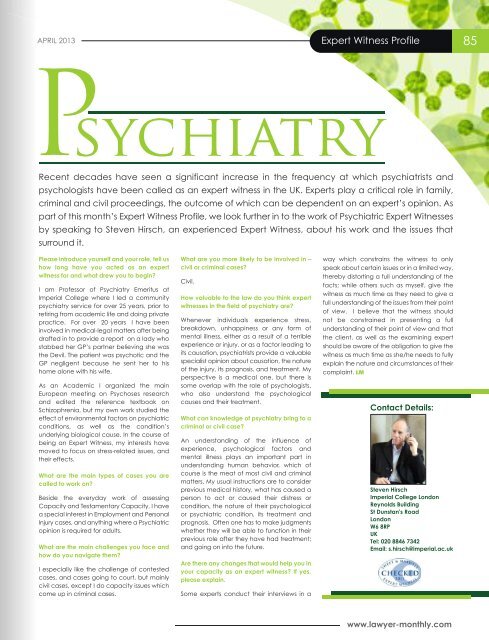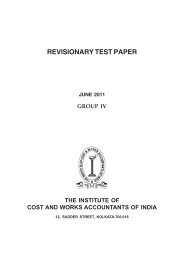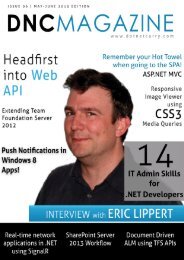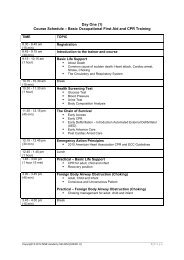Back Issue - Amazon Web Services
Back Issue - Amazon Web Services
Back Issue - Amazon Web Services
Create successful ePaper yourself
Turn your PDF publications into a flip-book with our unique Google optimized e-Paper software.
APRIL 2013Expert Witness Profile 85PsychiatryRecent decades have seen a significant increase in the frequency at which psychiatrists andpsychologists have been called as an expert witness in the UK. Experts play a critical role in family,criminal and civil proceedings, the outcome of which can be dependent on an expert’s opinion. Aspart of this month’s Expert Witness Profile, we look further in to the work of Psychiatric Expert Witnessesby speaking to Steven Hirsch, an experienced Expert Witness, about his work and the issues thatsurround it.Please introduce yourself and your role, tell ushow long have you acted as an expertwitness for and what drew you to begin?I am Professor of Psychiatry Emeritus atImperial College where I led a communitypsychiatry service for over 25 years, prior toretiring from academic life and doing privatepractice. For over 20 years I have beeninvolved in medical-legal matters after beingdrafted in to provide a report on a lady whostabbed her GP’s partner believing she wasthe Devil. The patient was psychotic and theGP negligent because he sent her to hishome alone with his wife.As an Academic I organized the mainEuropean meeting on Psychoses researchand edited the reference textbook onSchizophrenia, but my own work studied theeffect of environmental factors on psychiatricconditions, as well as the condition’sunderlying biological cause. In the course ofbeing an Expert Witness, my interests havemoved to focus on stress-related issues, andtheir effects.What are the main types of cases you arecalled to work on?Beside the everyday work of assessingCapacity and Testamentary Capacity, I havea special interest in Employment and PersonalInjury cases, and anything where a Psychiatricopinion is required for adults.What are the main challenges you face andhow do you navigate them?I especially like the challenge of contestedcases, and cases going to court, but mainlycivil cases, except I do capacity issues whichcome up in criminal cases.What are you more likely to be involved in –civil or criminal cases?Civil.How valuable to the law do you think expertwitnesses in the field of psychiatry are?Whenever individuals experience stress,breakdown, unhappiness or any form ofmental illness, either as a result of a terribleexperience or injury, or as a factor leading toits causation, psychiatrists provide a valuablespecialist opinion about causation, the natureof the injury, its prognosis, and treatment. Myperspective is a medical one, but there issome overlap with the role of psychologists,who also understand the psychologicalcauses and their treatment.What can knowledge of psychiatry bring to acriminal or civil case?An understanding of the influence ofexperience, psychological factors andmental illness plays an important part inunderstanding human behavior, which ofcourse is the meat of most civil and criminalmatters. My usual instructions are to considerprevious medical history, what has caused aperson to act or caused their distress orcondition, the nature of their psychologicalor psychiatric condition, its treatment andprognosis. Often one has to make judgmentswhether they will be able to function in theirprevious role after they have had treatment;and going on into the future.Are there any changes that would help you inyour capacity as an expert witness? If yes,please explain.Some experts conduct their interviews in away which constrains the witness to onlyspeak about certain issues or in a limited way,thereby distorting a full understanding of thefacts; while others such as myself, give thewitness as much time as they need to give afull understanding of the issues from their pointof view. I believe that the witness shouldnot be constrained in presenting a fullunderstanding of their point of view and thatthe client, as well as the examining expertshould be aware of the obligation to give thewitness as much time as she/he needs to fullyexplain the nature and circumstances of theircomplaint. LMContact Details:Steven HirschImperial College LondonReynolds BuildingSt Dunstan's RoadLondonW6 8RPUKTel: 020 8846 7342Email: s.hirsch@imperial.ac.ukwww.lawyer-monthly.com
















